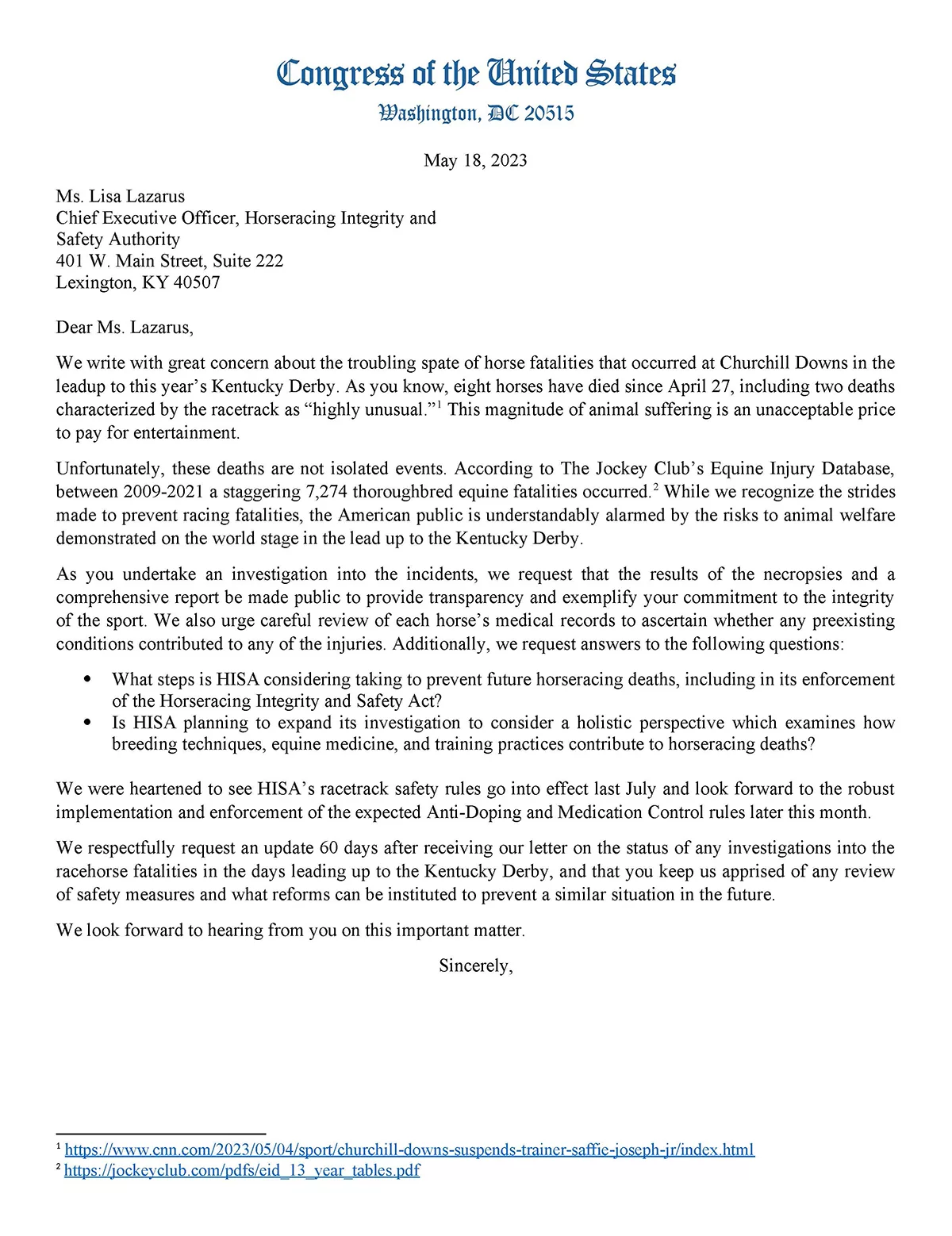Bipartisan Congressional Letter Calls for Full Investigation into Horse Deaths Leading Up to Kentucky Derby

Washington, D.C. – Last week, U.S. Representative Earl Blumenauer (D-OR), along with 15 other members of Congress, delivered a bipartisan letter urging the Horseracing Integrity and Safety Authority (HISA) to conduct a comprehensive investigation into the eight horse deaths that occurred in the lead-up to this year’s Kentucky Derby. The letter emphasizes the need for transparency, public disclosure of the investigation’s results, and evaluation of the role of HISA in preventing future fatalities in horseracing.
The alarming number of horse deaths, particularly in high-profile events like the run-up to the Kentucky Derby, has sparked concerns about the welfare of the animals and the safety measures in place within the racing industry. The letter, addressed to Ms. Lisa Lazarus, CEO of HISA, highlights the urgent need for a thorough examination of the incidents and calls for an evaluation of thoroughbred breeding techniques to determine if they contribute to the fatalities.
Dr. Joanna Grossman, equine program director and senior advisor for the Animal Welfare Institute, said, “Horses shouldn’t have to lose their lives in service to the profit-driven racing industry, and the recent fatalities at Churchill Downs and Pimlico must be fully investigated to help prevent these tragedies in the future,” in a statement regarding the letter.
In their letter, the members of Congress request that HISA provides public access to the results of the necropsies conducted on the deceased horses and issues a comprehensive report that demonstrates the authority’s commitment to upholding the integrity of horseracing. They also urge HISA to review each horse’s medical records to identify any preexisting conditions that may have contributed to their injuries or deaths.
The letter includes specific questions for HISA regarding the steps they plan to take to prevent future fatalities, including the enforcement of the Horseracing Integrity and Safety Act. The members of Congress also inquire whether HISA intends to broaden the scope of the investigation to encompass breeding techniques, equine medicine, and training practices, all of which may play a role in horseracing deaths.
The timing of the letter is significant as HISA’s anti-doping and medication regulations finally came into effect recently, following multiple delays. These regulations aim to establish a unified set of rules governing drug use in horseracing across the United States. Despite initial opposition and legal challenges, the regulations have been restored and are now in effect.
The hurdles the regulations faced highlight the complexity and controversy surrounding the implementation of these federal drug rules. While the concept of having uniform regulations for the industry has garnered broad support, the specifics of the rules and their creation have been subjects of contention among stakeholders.
Although legal battles over the constitutionality of HISA are ongoing, Texas federal judge Wes Hendrix refused a request from the National Horsemen’s Benevolent and Protective Association (HBPA) and other plaintiffs to block the new rules from being restored. The regulations, outlined in a 132-page document, cover various aspects, including a standardized list of banned substances and methods, restrictions on the use of Lasix, revised drug testing protocols, and the establishment of a results-management system.
Lisa Lazarus, CEO of HISA, expressed confidence in the newly implemented regulations to Horse Racing Nation, emphasizing their importance in strengthening the integrity and safety of horseracing while prioritizing horse welfare. Prominent trainer Bob Baffert also welcomed the new rules, considering them a positive development, while other trainers expressed concerns over potential costs and the need for rule-making by individuals with in-depth industry knowledge.
The restoration of the medication rules affects racing across the country, except for tracks in Texas and Nebraska, whose regulators and operators opted out of HISA amid ongoing legal battles. These exclusions prevent Lone Star Park and Fonner Park from accepting out-of-state bets on their races.
With the resumption of the anti-doping and medication control program, HISA aims to usher in a new era for horseracing, prioritizing safety, and working towards enhancing public trust in the sport. The enforcement of these regulations marks a significant step forward, but further scrutiny and monitoring will be required to ensure the integrity and welfare of racehorses are adequately protected.
Recommended Posts

Kamala Harris needs a VP candidate. Could a governor fit the bill?
Fri, July 26, 2024
After cyber-attack on Jefferson County Clerk, Fayette counterpart discusses precautions
Fri, July 26, 2024
An eastern Kentucky animal shelter is swelling this summer
Fri, July 26, 2024
